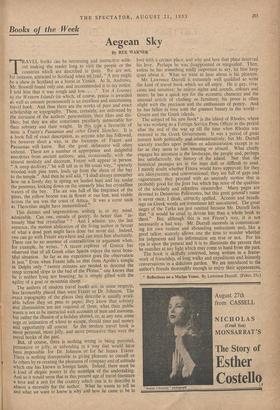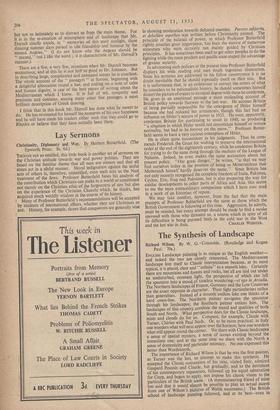Books of the Week
Aegean Sky
By REX WARNER TRAVEL books can be interesting and instructive with- out making the reader long to visit the people or the countries which are described in them. We are not, for instance, attracted to Scotland when we read, " A tree might be a show in Scotland as a horse in Venice. At St. Andrews. Mr. Boswell found only one, and recommended it to my notice. I told him that it was rough and low. . . ." Yet A Journey to the Western Islands (in which, of course, praise is awarded as well as censure pronounced) is an excellent and entertaining travel book. And then there are the works of pure and exact scholarship or topography. These, certainly, are enlivened by the intrusion of the authors' personalities, their likes and dis- likes; but they are also sometimes peculiarly memorable for their sobriety and their weight. In this type a favourite of mine is Frazer's Pausanias and other Greek Sketches. It is a book full of exact description, as anyone who has followed, for however short a way, in the footsteps of Frazer and Pausanias will know. But the great delineator will often unbend. There are a number of appropriate and delightful anecdotes from ancient authors; and, occasionally, with the utmost modesty and decorum, Frazer will appear in person. " A steep declivity," he will tell us in his usual way, " sparsely wooded with pine trees, leads up from the shore of the bay to the temple." And then he will add, " I shall always remember how on a lovely day in spring we landed here and lay under the pinetrees, looking down on the intensely blue but crystalline waters of the bay. The air was full of the fragrance of the pines, the yellow broom was in flower at our feet, and visible across the sea was the coast of Attica. It was a scene such as Theocritus might have immortalised."
This distinct and unpretentious writing is, to my mind, admirable. Can one, outside of poetry, do better than " in- tensely blue but crystalline " ? And I admire, too, the last sentence, the modest abdication of the living author in favour of what a dead poet might have done but never did. Indeed, one can go with Frazer anywhere and can trust him absolutely. There can be no murmur of contradiction or argument when, for example, he writes, " A recent explorer of Greece has observed that of all Greek cities Sparta enjoys the most beau- tiful situation. So far as my experience goes the observation is just." Even when Frazer tells us that from Apollo's temple in Delphi only " twenty minutes are needed to descend the steep terraced slope to the bed of the Plistus," one knows that he is neither lying nor boasting; he is simply gifted with the agility of a goat or mountain sheep.
The authors of modem travel booki are, in some respects, less favourably placed than were Frazer or Dr. Johnson. The exact topography of the places they describe is usually avail- able before they set pens to paper; they know that sobriety and illumination are not required of them; what their public wants is not to be instructed with accounts of men and manners, but rather the illusion of a holiday abroad, or, at any rate, some urge or intimation of where to escape, should time and money and opportunity all concur. So the modern travel book is more personal, more jolly, and more persuasive than were the travel books of the past. But, of course, there is nothing wrong in being personal, persuasive or jolly, in unbending in a way that would have been impossible for Dr. Johnson or for Sir James Frazer. There is nothing disreputable in giving pleasure to oneself or to others by re-creating the pleasures of company and of solitude which one has known in foreign lands. Indeed, there must be a kind of elegaic poetry in the nostalgia of the undertaking. And so it would seem that in this present age of travel literature a love and a zest for the country which one is to describe is almost a necessity for the author. What he wants to tell us and what we want to know is why and how he came to be in love with a certain place, and why and how that place deserved his love. Perhaps he was disappointed or misguided. Then, unless he has something really important to say, let him keep quiet about it. What we want to hear about is his pleasure. Mr. Lawrence Durrell is extremely well qualified to write the kind of travel book which we all enjoy. He is gay, viva- cious and sensitive; he enjoys sights and sounds, colours and tastes; he has a quick eye for the eccentric character and the unusual article of clothing or furniture; his prose is often alight with the precision and the enthusiasm of poetry. And he has fallen in love with the greatest beauty in the world— Greece and the Greek islands.
The subject of his new book* is the island of Rhodes, where he was working as a Foreign Service Press Officer in the period aftor the end of the war up till the time when Rhodes was restored to the Greek Government. It was a period of great interest both politically and administratively; but Mr. Durrell scarcely touches upon politics or administration except in so far as they seem to him amusing or absurd. What chiefly engages his attention is the landscape, the people and, perhaps less satisfactorily, the history of the island. Not that the historical passages are in the least dull or difficult to read. I merely doubt whether Frazer would have approved; for they are idiosyncratic and conversational; they are full of gaps and vaguenesses; they proceed with an unsteady motion that is probably good for the Jiver but which has none of the qualities of the scholarly and relentless steamroller. Many pages are devoted to Demetrius Poliorcetes, but this great general's name is never once, I think, correctly spelled. Accents and breath- ings on Greek words are sometimes left unscattered. The great sieges of the Turks are just omitted because Mr. Durrell feels that " it would be cruel to devote less than a whole book to them." But, although this is not Frazer's way, it is not necessarily a bad way. Mr. Durrell succeeds in communicat- ing his own restless and abounding enthusiasm and, like a good talker, scarcely allows one the time to wonder whether his judgments and his information are true or not. For his eye is upon the present and it is to illuminate the present that he snatches at any light which may come to hand from the past.
The book is skilfully contrived, being written in a frame- work of friendship, of long walks and expeditions and leisurely conversations in a delicious garden. We are introduced to the author's friends thoroughly enough to enjoy their appearances, * Reflections on a Marine Venus. By Lawrence Durrell. (Faber. 25s.)
but not so intimately as to distract us from the main theme. For it is in the re-creation of atmosphere and of landscape that Mr. Durrell chiefly excels, in " memories of this pure sunlight, these dancing summer days passed in idle friendship and humour by the maned Aegean." (I do not know why the Aegean should be " maned," but I like the word ; it is characteristic of Mr. Durrell's manner.) There are a few, a very few, occasions when Mr. Durrell becomes sententious, and at this he is not half so good as Dr. Johnson. But in describing large, complicated and animated scenes he is excellent. The whole account of the " panagyri " at Soroni, beginning with a delightful altercation round a bus, and ending on a note of calm and human dignity, is one of the best pieces of writing about the Mediterranean which I know. It is full of wit, sympathy and precision and contains, among many other fine passages, a most brilliant description of Greek dancing.
' I think that in this book Mr. Durrell has done what he meant to do. He has re-created for himself the moments of his own happiness and he will have made his readers either wish that they could go to Rhodes or believe that they have actually been there.



























 Previous page
Previous page